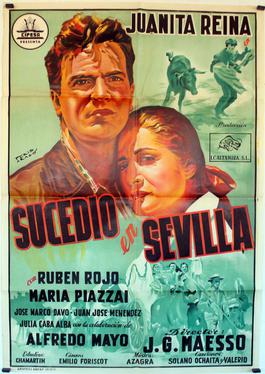Plot summary
| | This section needs expansion. You can help by adding to it. (June 2023) |
| Don Juan | |
|---|---|
| Directed by | John Berry |
| Written by | |
| Produced by |
|
| Starring | |
| Cinematography | Nicolas Hayer |
| Edited by | Marinette Cadix Antonio Ramírez de Loaysa |
| Music by | Henri Sauguet |
Production companies |
|
| Distributed by | Pathé Consortium Cinéma (France) C.E.A. Distribución (Spain) |
Release date |
|
Running time | 93 minutes |
| Countries |
|
| Language | French |
Don Juan is a 1956 historical comedy film directed by John Berry and starring Fernandel, Carmen Sevilla and Roland Armontel. [1] It was a co-production between France, Italy and Spain, based on the legend of Don Juan.
The film's sets were designed by the art directors Sigfrido Burmann and Georges Wakhévitch.
| | This section needs expansion. You can help by adding to it. (June 2023) |

Aventuras en el tiempo is a Mexican comedy drama telenovela produced by Rosy Ocampo for Televisa in 2001.

José Enrique Benito y Emeterio Ysbert Alvarruiz, also known as José Isbert and/or Pepe Isbert, was a Spanish actor.

Manolo Morán was a Spanish film actor.

María del Carmen García Galisteo, known professionally as Carmen Sevilla, was a Spanish actress, singer, and dancer. She began her career in the 1940s and became one of the most popular and highest paid stars of Spanish cinema until the 1970s. In 1991, at the age of sixty, she began her career as a television presenter, working for the three major Spanish networks until her retirement in 2010. At the time of her death, she was one of the last surviving stars from the Golden Age of Mexican cinema and from the Golden Age of Hollywood.

Adventures of the Barber of Seville is a 1954 French-Spanish comedy film directed by Ladislao Vajda and starring Luis Mariano, Lolita Sevilla and Danielle Godet. It was entered into the 1954 Cannes Film Festival.
Carmen Sánchez was a Spanish producer, dancer, and actress. She started her career as dancer and singer of zarzuela at very young age. At age 20, she finished working on copla or chotis and was featured in films between 1927 and 1928. She was a pioneer of silent films. She became a famous Spanish actress after the Spanish Civil War.
La antorcha encendida is a Mexican telenovela produced by Ernesto Alonso and Carlos Sotomayor for Televisa in 1996. It was the last historical telenovela produced by Televisa. The plot tells the Independence of Mexico, with an emphasis on historical accuracy. It was written by Fausto Zeron Medina in collaboration with Liliana Abud. It premiered on Canal de las Estrellas on May 6, 1996, and ended on November 15, 1996.
Médico de guardia is a 1950 Mexican film. It was produced by Fernando de Fuentes.
Dawn Breaks, Which Is No Small Thing is a 1989 Spanish surrealist comedy film written and directed by José Luis Cuerda. It has attained cult film status.
The Holy Crown is a 1947 Spanish-Portuguese historical drama film starring Maruchi Fresno, António Vilar and Luis Peña. Separate Spanish and Portuguese versions were filmed with the Spanish directed by Rafael Gil and the Portuguese by Henrique Campos and Aníbal Contreiras. It was part of a popular group of Spanish costume films made in the late 1940s.
Tales of the Alhambra is a 1950 Spanish comedy film directed by Florián Rey and starring Carmen Sevilla, Aníbal Vela and Manuel Arbó. The film is an adaptation of Washington Irving's 1832 short stories of the same title.
Beatriz is a 1976 Spanish-Mexican drama film directed by Gonzalo Suárez which stars Sandra Mozarowsky as the title character alongside Carmen Sevilla, Nadiuska, Jorge Rivero, and José Sacristán. It is based on Ramón del Valle Inclán's stories Beatriz and Mi hermana Antonia.
The Balcony of the Moon is a 1962 Spanish musical comedy film directed by Luis Saslavsky and starring Carmen Sevilla, Lola Flores and Paquita Rico. Its critical and commercial failure illustrated the declining popularity of the Andalusian musical, one of the most popular Spanish genres of the 1950s.

It Happened in Seville is a 1955 Spanish musical film directed by José Gutiérrez Maesso and starring Juanita Reina, Rubén Rojo and Alfredo Mayo. It is a remake of the 1942 film The White Dove in which Reina had also starred. It was remade again in 1966 as Road to Rocío with Carmen Sevilla as the lead.
The Faith is a 1947 Spanish drama film directed by Rafael Gil and starring Amparo Rivelles, Rafael Durán and Guillermo Marín.

Old Shirt to New Jacket is a 1982 Spanish comedy film directed by Rafael Gil and starring José Luis López Vázquez, Manolo Codeso and Antonio Garisa.

Queen of the Chantecler is a 1962 Spanish historical drama film directed by Rafael Gil and starring Sara Montiel, Alberto de Mendoza and Luigi Giuliani. A Spanish music hall entertainer gets caught up in espionage during the First World War, as she finds true love with a country boy who does not know her true identity.
The Little Colonel is a 1960 Spanish historical musical film directed by Antonio del Amo and starring Joselito, Carlos Larrañaga and María Mahor.

The Lieutenant Nun is a 1944 Mexican historical adventure film directed by Emilio Gómez Muriel and starring María Félix, Ángel Garasa and José Cibrián. It is based on the life of Catalina de Erauso.
Don Juan is a 1974 Spanish comedy television special by Televisión Española, directed by Antonio Mercero, written by Juan Farias and Lola Salvador, with music by Adolfo Waitzman. It first aired on 1 June 1974 on Televisión Española's Primera Cadena. It won the Rose d'Or award and a Special Mention from the Press at the 1974 Montreaux Festival. It was also nominated for an International Emmy Award that same year.